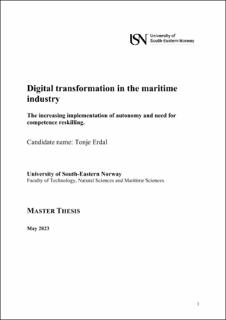| dc.description.abstract | Today’s ongoing development of technology shows promising impact on the maritime industry. The use of technological tools is growing, and new developments are continuously ready to take over tasks that are done by humans today. In the maritime industry, there is an increasing focus on digital solutions and autonomous vessels that facilitate labor previously done by workers on ships. This technology shows good prospects for maritime jobs and operations, which could ensure more efficient shipping and ease of chores for the workers.
Although we see such a positive development in the future, it raises a concern about whether we are equipped enough to cope with the upheaval that technology brings. Could there for example be a change in competence requirements to operate these autonomous vessels, that we are not prepared for? The digitalization raises a concern regarding what skills future employees will need to adapt to in order to operate alongside the technology. A consequence of modernization could be a greater focus on for example IT than navigation in schools and workplaces. This would ultimately lead to a need for reskilling the maritime employee.
Dramatically transforming the work tasks sometimes leads to a loss of tacit knowledge in an organization and therefore reskilling could be important for the future maritime industry. With such a change in focus and practice, one should consider which challenges could arise. The world is changing, but is the industry tagging along? It is possible that this focus shift will reveal tasks that cannot be replaced by machines and autonomous systems, but rather bring awareness on work tasks and safety routines that will require people to do the work themselves, physically present. Today a lot of the focus is on what technology and autonomy can provide us and how it can relieve humans from work. While this thesis will explore the subject from a different perspective, rather looking at which areas humans are not so replaceable by technology, and the importance of a human-technology balance and reskilling.
The need for continuous implementation and adaptation is very important, meaning looking at what types of competencies and needs are going to be required in the future to benefit the most from this digital and autonomous transformation. Highlighting the need for also adapting and changing competence according to the technology, could provide better usage and understanding of the tools implemented. It could also help the maritime industry gain more strategic knowledge and a bigger competitive advantage in their segment.
The method used in this thesis is quantitative data collection, in the form of a distributed questionnaire. Information has also been collected from relevant articles to increase knowledge and insight on the subject in a literature review. Combining these two methods the thesis is based on previous quality studies and research, and current opinions from key persons in the maritime segment. The results gathered from the questionnaire shed light on various opinions on digitalization in the maritime industry, both optimistic and critical. This was considered valuable information that confirmed a skepticism toward increased technology and also a need for reskilling maritime workers. | |
